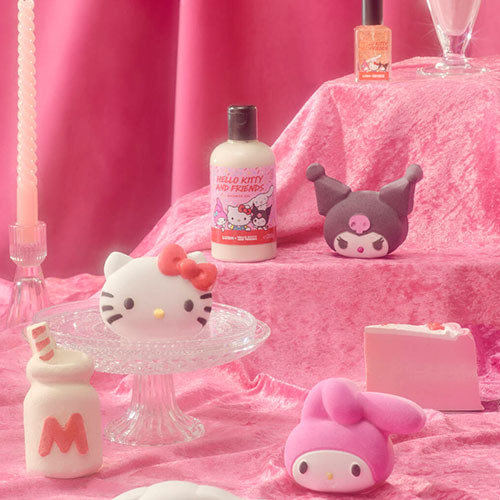Start Licensing’s Ian Downes takes in five food and drink related trade shows in one visit to Birmingham’s NEC this week.
Given the tendency for the food and drink industry to run buy one get one free style promotions, it is quite fitting that this week there were five food and drink related shows running at the NEC at the same time. Visit one show and get four free – in fact all the shows are free to attend, but having five connected shows under one roof makes sense and represents ‘good value’ for trade show visitors.
Organised by William Reed, the publisher of The Grocer and Convenience Store magazines, the five shows feature 1,200 food and drink related exhibitors. For the record, the five shows are the Farm & Deli Show, Food & Drink Expo, The Forecourt Show, National Convenience Show and The Restaurant Show.
Given the volume of exhibitors and the content, it is no surprise that licensing and licensed ranges featured.
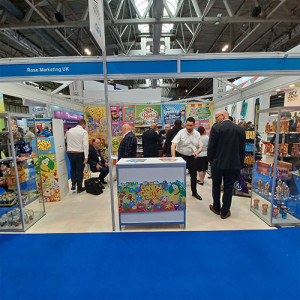 Leading licensee Rose Marketing, which has a mixed portfolio of licensed lines and non-licensed lines, was in attendance with a well stocked stand. It is a company with a long-track record in licensing and its portfolio includes Tango, Robinson’s, SLUSH PUPPiE and Swizzels.
Leading licensee Rose Marketing, which has a mixed portfolio of licensed lines and non-licensed lines, was in attendance with a well stocked stand. It is a company with a long-track record in licensing and its portfolio includes Tango, Robinson’s, SLUSH PUPPiE and Swizzels.
Rose is a good example of a licensee that has built a portfolio of products with its licensed brands including a range of confectionery lines, as well as newer lines such as ambient jellies and freeze at home ice pops. It has recognised that well chosen licences can give it a point of difference while creating NPD opportunities.
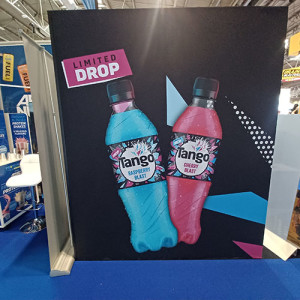 Working with food and drinks brands gives it a foothold in the market, as the brands are well known by retailers. Brands like Tango and Swizzels also create good opportunities for authentic product development linked to taste and flavour. There is definitely an appetite from consumers to explore a wider range of flavours in confectionery these days. Rose is also very active in developing hybrid product and packaging formats, opening up impulse and gifting opportunities while also opening up new distribution opportunities. It is worth noting how retailers like HMV now sell food and drink products.
Working with food and drinks brands gives it a foothold in the market, as the brands are well known by retailers. Brands like Tango and Swizzels also create good opportunities for authentic product development linked to taste and flavour. There is definitely an appetite from consumers to explore a wider range of flavours in confectionery these days. Rose is also very active in developing hybrid product and packaging formats, opening up impulse and gifting opportunities while also opening up new distribution opportunities. It is worth noting how retailers like HMV now sell food and drink products.
Licensed brands delivering unique taste and flavour opportunities to licensees was definitely a recurring theme throughout the shows. Manchester Drinks has a range of licensed ready to drink and freeze at home slushie style products featuring licences such as Toxic Waste, SLUSH PUPPiE and Fruit-tella – flavour and taste are key here along with brand recognition. Brand owners seem to like products like the Manchester Drinks ones as they give consumers new ways to consume their favourite brands, while they extend the brands’ retail footprint.
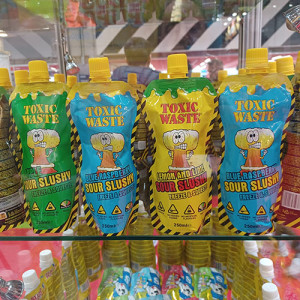 Certain food and drink brands suit certain brand extensions more than others. For example, confectionery and drinks brands are well matched to the slushie drink category, hence a lot of licensed developments here.
Certain food and drink brands suit certain brand extensions more than others. For example, confectionery and drinks brands are well matched to the slushie drink category, hence a lot of licensed developments here.
Britvic has been a long-term player in the Slush machine market with Tango Ice Blast and Robinson’s Slush machines well represented in retail. Indeed Britvic used the shows to promote the launch of two new Tango products featuring flavours that were originally launched as Slush flavours – a good insight into how developments in this sector can be interlinked and related categories can influence each other.
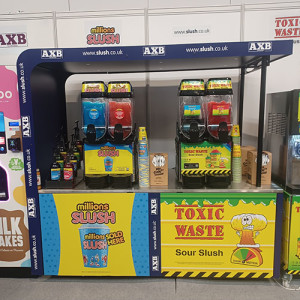 Within the Slush machine category it was interesting to see confectionery brands Toxic Waste and Millions launching in the category. It certainly seems to be a category with a lot of activity in it. These sorts of machines seem to be particularly attractive to convenience stores creating incremental sales opportunities, but they are also present in the leisure sector and in garages. It is worth remembering that, in addition to the revenue they can generate, they deliver great brand visibility for brands in retail as well.
Within the Slush machine category it was interesting to see confectionery brands Toxic Waste and Millions launching in the category. It certainly seems to be a category with a lot of activity in it. These sorts of machines seem to be particularly attractive to convenience stores creating incremental sales opportunities, but they are also present in the leisure sector and in garages. It is worth remembering that, in addition to the revenue they can generate, they deliver great brand visibility for brands in retail as well.
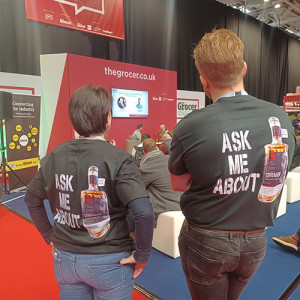 The alcohol sector is another one that has used brand licensing more frequently in recent years. Licensing in this category has to be approached with care and with regard to advertising regulations, but brands like the Ashmolean, the RHS and the National Gallery are good examples of ones that have activated their brands within it. It is also a category that has seen celebrities getting involved, for example Kylie Minogue and Graham Norton have wine brands.
The alcohol sector is another one that has used brand licensing more frequently in recent years. Licensing in this category has to be approached with care and with regard to advertising regulations, but brands like the Ashmolean, the RHS and the National Gallery are good examples of ones that have activated their brands within it. It is also a category that has seen celebrities getting involved, for example Kylie Minogue and Graham Norton have wine brands.
Against this backdrop I found it fascinating to hear from Game of Thrones actor, James Cosmo, about his involvement with the Storyman whisky brand he has developed with the Annandale Distillery. James was interviewed about the product and gave a really good insight into the story behind Storyman. A key point he made was that he wanted the development to be an authentic one where his involvement was genuine and detailed rather than a transitory relationship. The Storyman whisky was attracting interest at the show not least because of its striking design – I didn’t try any, but listening to James I am sure it tastes as good as it looks. Authenticity certainly seems to be a key requirement these days in development terms, but also in regards to consumer expectations around products and product development.
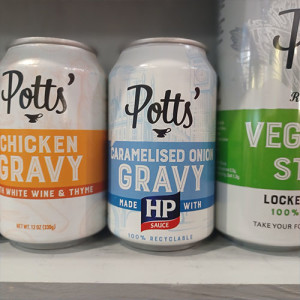 As many of you will be aware, the Brand & Lifestyle Licensing Awards took place last week, and food and drink feature. It was good to see one of the companies nominated, Potts, exhibiting at the NEC. Its range at the show included the B&LLAs nominated HP Sauce flavoured gravy, again emphasising how distinct and unique flavours can help brands make the jump into licensing. In the context of Potts’ business, I am hazarding a guess the link with HP has generated a lot of interest and has helped it articulate the benefits of the product to the trade well.
As many of you will be aware, the Brand & Lifestyle Licensing Awards took place last week, and food and drink feature. It was good to see one of the companies nominated, Potts, exhibiting at the NEC. Its range at the show included the B&LLAs nominated HP Sauce flavoured gravy, again emphasising how distinct and unique flavours can help brands make the jump into licensing. In the context of Potts’ business, I am hazarding a guess the link with HP has generated a lot of interest and has helped it articulate the benefits of the product to the trade well.
Another good example of a strong and distinctive flavour being used in a category to deliver a point of difference was Jimmy’s using Tabasco Sauce to flavour popcorn. Not only does this deliver a unique taste experience, it also works visually creating a strong on and off shelf identity in a competitive category.
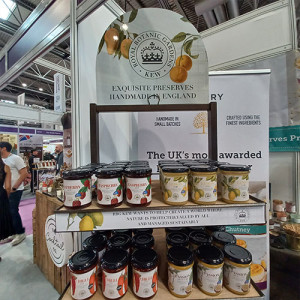 As noted earlier, heritage brands are active in the food and drink sector so it was no surprise to find a great example of a heritage brand working with a food company at the Farm & Deli Show, I think (with five shows in one you can lose your bearings occasionally).
As noted earlier, heritage brands are active in the food and drink sector so it was no surprise to find a great example of a heritage brand working with a food company at the Farm & Deli Show, I think (with five shows in one you can lose your bearings occasionally).
Producer The Cherry Tree has created a range of jams in collaboration with Kew, with the flavours featuring traditional recipes with a Kew twist. Produced in small batches, this is a great example of how a well chosen licence can help a smaller producer elevate their presence at retail and create a new reason for retail buyers to purchase from them. Again, thinking about authenticity, there is a strong back story to this partnership and a good news story about the royalties generated from sales contributing to Kew’s conservation work. Design wise the product looks good and is well suited to outlets such as farm shops.
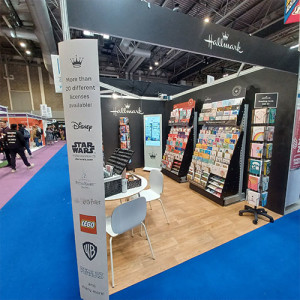 Given the nature of the five events there were a significant amount of non-food products on show – manufacturers realising these shows provide a good route to markets such as convenience stores, farm shops and petrol forecourt shops. Greeting cards company Hallmark had a stand at the show featuring a number of its card ranges including licensed lines. This was good to see, not least as it shows a proactive approach by a licensee in finding and consolidating new distribution for licensed products.
Given the nature of the five events there were a significant amount of non-food products on show – manufacturers realising these shows provide a good route to markets such as convenience stores, farm shops and petrol forecourt shops. Greeting cards company Hallmark had a stand at the show featuring a number of its card ranges including licensed lines. This was good to see, not least as it shows a proactive approach by a licensee in finding and consolidating new distribution for licensed products.
Another non-food licensed product that caught my eye was a range of products from Wildlife World developed with TV naturalist Simon King. The products included a new line of Woolly the Sheep ceramic holders that hold wool that can be used by birds for nesting. These were presented in counter top boxes that would no doubt work well at till points in retailers like farm shops and garden centres. In this context, having a credible name such as Simon King endorsing the product really helps as he brings authenticity.
All in all, a day well spent at the NEC and the 5 for 1 show offer worked well for me – it represented real value, saving me a lot of time. It also reinforced the fact that the best licences in the sector are ones built on authenticity and ones that use the attributes of the licensed brand as faithfully as they can – taste and flavour being a key to success.
It is also a show that one never goes hungry or thirsty at – I learnt years ago to save myself for the ample supply of tasting samples available at the shows. One thing I noticed as a vegetarian is that there are far more manufacturers catering for vegetarian and vegan diets these days… or maybe I am just getting greedier in my old age!
Ian Downes runs Start Licensing, an independent brand licensing agency. His X handle is @startlicensing – he would welcome your suggestions for what to look out for.























